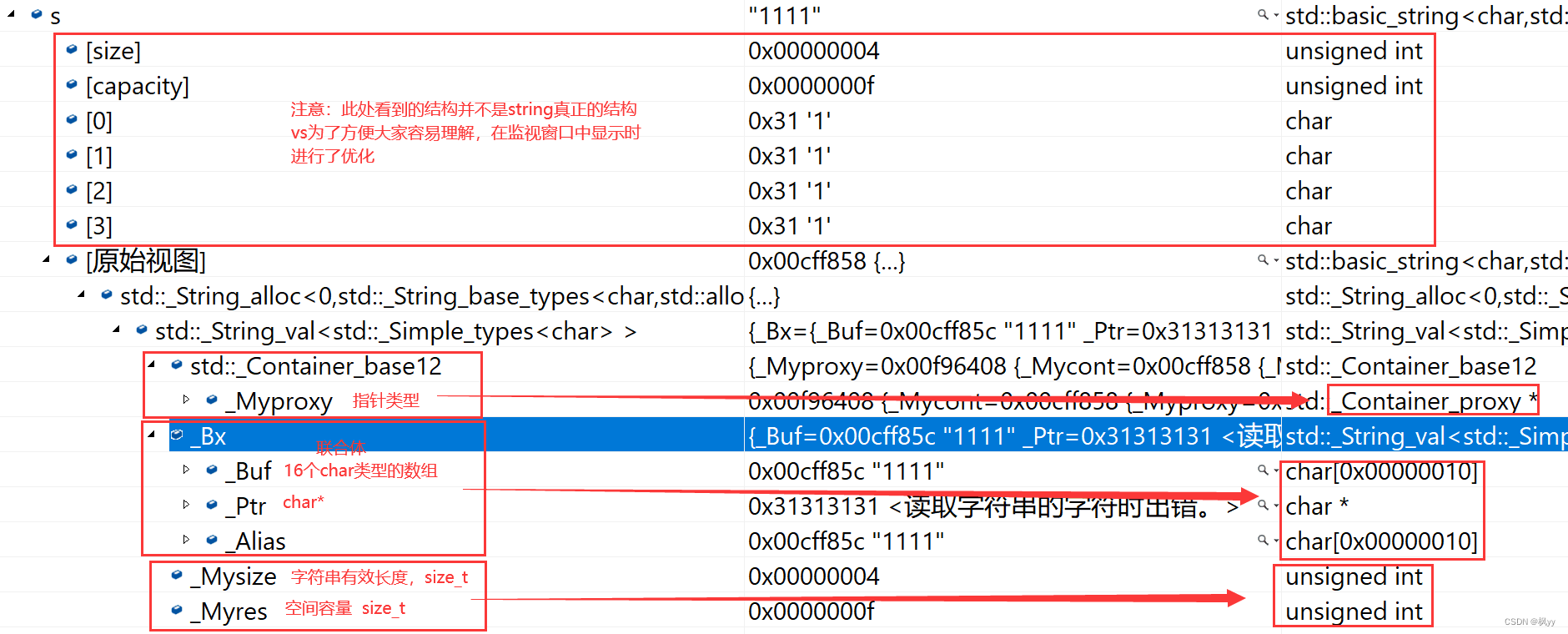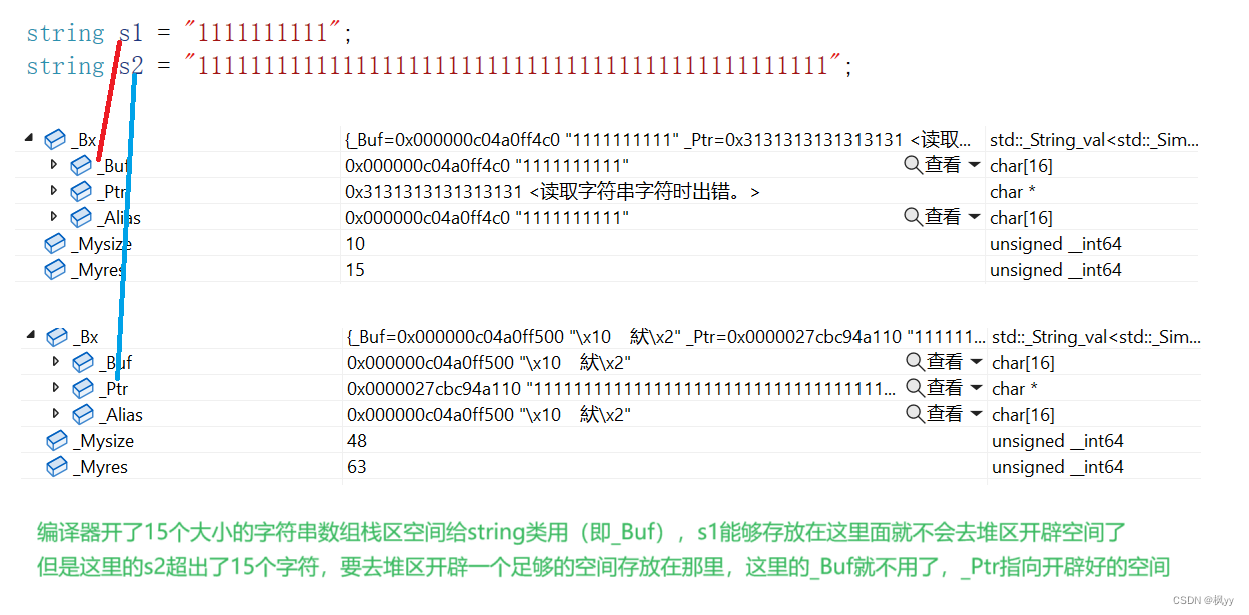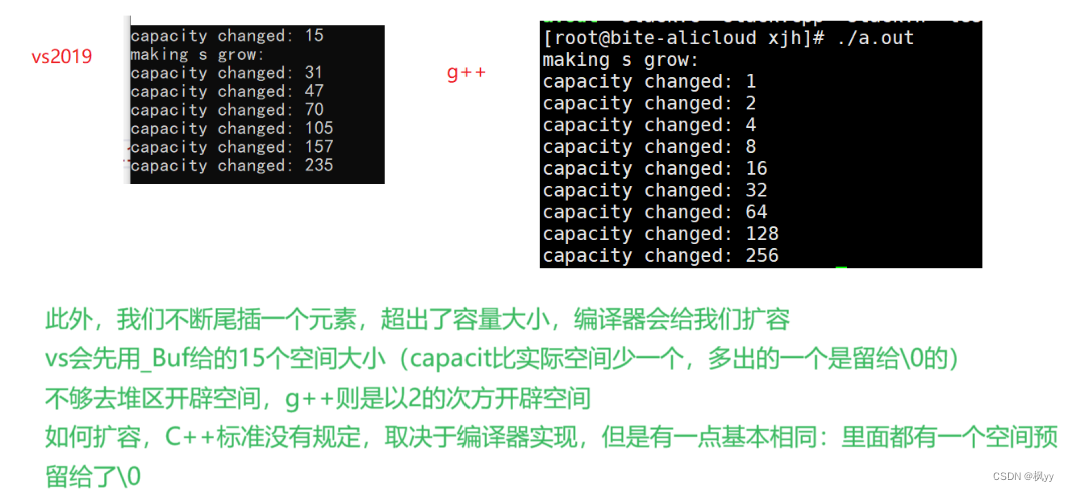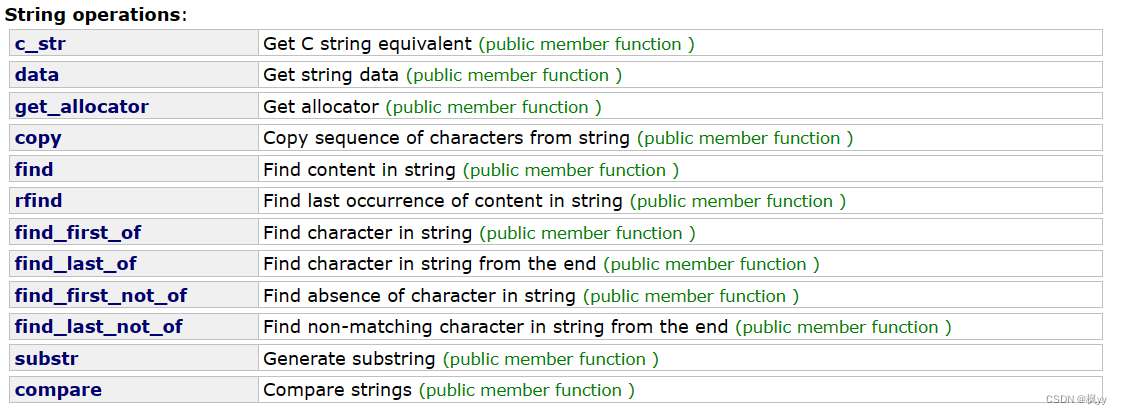目录
size & max_size & length & capacity
find_first_not_of & find_last_not_of
string类的常用接口说明
string类对象的容量操作

函数名称 功能说明 size(重点) 返回字符串有效字符长度(不包括\0) length 返回字符串有效字符长度 capacity 返回空间总大小 empty (重点) 检测字符串释放为空串,是返回true,否则返回false clear (重点) 清空有效字符 reserve (重点) 为字符串预留空间** resize (重点) 将有效字符的个数该成n个,多出的空间用字符c填充
size & max_size & length & capacity
void test_string7()
{
string s1 = "hello world";
cout << s1.size() << endl; //输出11
cout << s1.length() << endl; //输出11
cout << s1.capacity() << endl; //输出15
string s2;
cout << s2.size() << endl; //输出0
cout << s2.length() << endl; //输出0
cout << s2.capacity() << endl; //输出15
}
这三个相当简单,不过多赘述,注意的是size返回字符串有效字符长度(不包括\0)
size()与length()方法底层实现原理完全相同,引入size()的原因是为了与其他容器的接口保持一 致,一般情况下基本都是用size()。
max_size返回字符串可以达到的最大长度,没啥用处,不用深度学习。
empty & clear
void test_string8()
{
string s1 = "hello world";
if (s1.empty())//输出no
cout << "yes" << endl;
else
cout << "no" << endl;
s1.clear();
if (s1.empty())//输出yes
cout << "yes" << endl;
else
cout << "no" << endl;
}
empty函数判度字符串是否为空,clear函数清空字符串。
clear()只是将string中有效字符清空,不改变底层空间大小。
reserve & resize
在了解这两个函数之前先了解编译器是怎么存储string类的数据的:
vs下string的结构
- string总共占28个字节,内部结构稍微复杂一点,先是有一个联合体,联合体用来定义string中字 符串的存储空间:
- 当字符串长度小于16时,使用内部固定的字符数组来存放 ;当字符串长度大于等于16时,从堆上开辟空间。
这种设计也是有一定道理的,大多数情况下字符串的长度都小于16,那string对象创建好之后,内 部已经有了16个字符数组的固定空间,不需要通过堆创建,效率高。
g++下string的结构
- G++下,string是通过写时拷贝实现的,string对象总共占4个字节,内部只包含了一个指针,该指针将来指向一块堆空间 。



reserve(size_t res_arg=0):为string预留空间,不改变有效元素个数,当reserve的参数小于 string的底层空间总大小时,reserve不会改变容量大小。 再三强调reserve和reverse的拼写区别!!
对string操作时,如果能够大概预估到放多少字符,可以先通过reserve把空间预留好。
void TestPushBack()
{
string s;
// 知道需要多少空间,提前开好
s.reserve(200);
//s[100] = 'x'; //无法赋值
}
注意:这里的开辟了200个空间只是提前预留好的,不能进去访问,否则会出错
void test_string9()
{
string s1;
// reserve 保留
// reverse 逆置 反转
s1.reserve(100);
cout << s1.capacity() << endl;
s1.reserve(20);
cout << s1.capacity() << endl;
}
另外注意不同编译器下reserve的处理方式不同,可能会缩容也可能不会。

如果要缩容,也只是另外开辟一半的空间,将原先空间的值拷贝一半进去,不能够在原来空间上缩容,归根结底还是空间换时间。

resize(size_t n) 与 resize(size_t n, char c)都是将字符串中有效字符个数改变到n个,不同的是当字符个数增多时:resize(n)用0来填充多出的元素空间,resize(size_t n, char c)用字符c来填充多出的元素空间。
void test_string11()
{
string s1;
//s1.resize(5, '0');
s1.resize(5);
s1[4] = '3';
s1[3] = '4';
s1[2] = '5';
s1[1] = '6';
s1[0] = '7';
cout << s1 << endl;
// 76543
// 插入(空间不够会扩容)
string s2("hello world");
s2.resize(20, 'x');
cout << s2 << endl;
//hello worldxxxxxxxxx
// 删除
s2.resize(5);
cout << s2 << endl;
//hello
}注意:resize在改变元素个数时,如果是将元素个数增多,可能会改变底层容量的大小,如果是将元素个数减少,底层空间总大小不变。
string类对象的元素访问

operator [ ]在上文已经详细解释,不再过多描述。
at & back & front
at 能获取字符串中的字符,返回对字符串中位置 pos 处的字符的引用。
void test_string12()
{
string s2("hi");
// 该函数会自动检查 pos 是否是字符串中字符的有效位置
// (即 pos 是否小于字符串长度)
// 如果不是,则抛出out_of_range异常。
try
{
s2.at(10);//非法访问
}
catch (const exception& e)
{
cout << e.what() << endl;
//输出 invalid string position
}
}
front 访问第一个字符,back 访问最后一个字符
void test_string13()
{
string s = "hello world";
s.back() = 'D';
s.front() = 'H';
cout << s << endl;
//输出Hello worlD
}string类对象的修改操作(字符串操作)

substr & find & rfind
void test_string14()
{
string file("string.cpp.zip");
// 在字符串中搜索其参数指定的序列的第一次出现项
size_t pos1 = file.find('.');
// 在字符串中搜索其参数指定的序列的最后一次出现项
size_t pos2 = file.rfind('.');
// 子字符串是对象中从字符位置开始并跨越字符(或直到字符串末尾,以先到者为准)的部分
// string suffix = file.substr(pos, file.size() - pos);
string suffix1 = file.substr(pos1); //默认到结束
cout << suffix1 << endl;//输出 .cpp.zip
string suffix2 = file.substr(pos2);
cout << suffix2 << endl;//输出 .zip
string suffix3 = file.substr(pos1,4);//从pos1开始跨越四个字符
cout << suffix3 << endl;//输出 .cpp
}注意:substr取的范围为左闭右开区间
find_first_of & find_last_of
void test_string15()
{
// strtok
std::string str("Please, replace the vowels in this sentence by asterisks.");
std::size_t found1 = str.find_first_of("aeiou");//在字符串中搜索与其参数中指定的任何字符匹配的第一个字符
std::size_t found2 = str.find_last_of("aeiou");//在字符串中搜索与其参数中指定的任何字符匹配的最后一个字符
str[found1] = '*';
str[found2] = '*';
std::cout << str << '\n';
//输出 Pl*ase, replace the vowels in this sentence by aster*sks.
}find_first_not_of & find_last_not_of
void test_string16()
{
// strtok
std::string str("Please, replace the vowels in this sentence by asterisks.");
std::size_t found1 = str.find_first_not_of("aeiou");//在字符串中搜索与其参数中指定的任何字符匹配的第一个字符
std::size_t found2 = str.find_last_not_of("aeiou");//在字符串中搜索与其参数中指定的任何字符匹配的最后一个字符
str[found1] = '*';
str[found2] = '*';
std::cout << str << '\n';
//输出 *lease, replace the vowels in this sentence by asterisks*
}compare

void test_string17()
{
string str1("green apple");
string str2("red apple");
if (str1.compare(str2) != 0)
std::cout << str1 << " is not " << str2 << '\n';
// 输出 green apple is not red apple
}C++98设置的类型过多,个人绝对记忆太过于繁琐,只需要了解几个有用的即可,比较是按照字典序大小比较的(ascii码比较)
copy & c_str
将字符串对象的当前值的子字符串复制到 s 指向的数组中,此子字符串包含从位置 pos 开始的 len 字符。
void test_string18()
{
char buffer[20];
string str("Test string...");
size_t length = str.copy(buffer, 6, 5);
buffer[length] = '\0';
cout << "buffer contains: " << buffer << '\n';
//输出 buffer contains: string
}
void test_string25()
{
string str = "Please split this sentence into tokens";
cout << str.c_str() << endl; // 以C语言的方式打印字符串
}





















 596
596

 被折叠的 条评论
为什么被折叠?
被折叠的 条评论
为什么被折叠?








